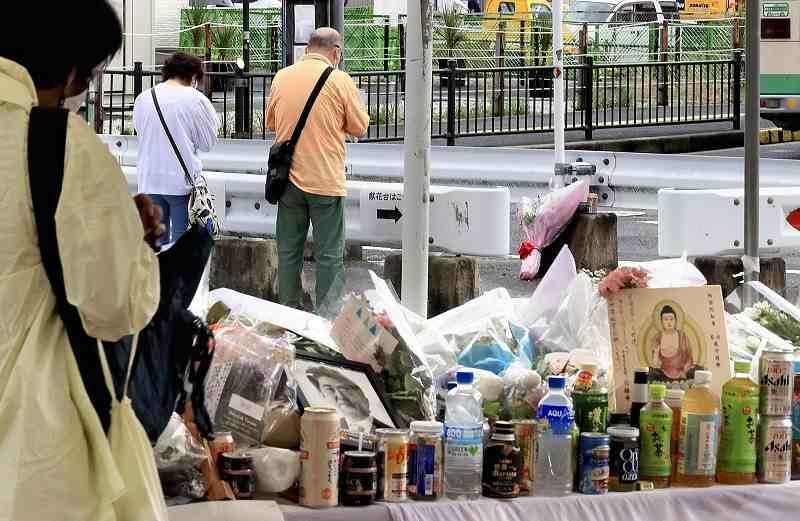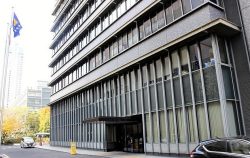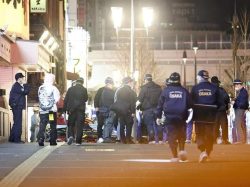
People offer prayers Tuesday near the site where former Prime Minister Shinzo Abe was fatally shot in Nara on July 8, 2022
17:05 JST, July 7, 2024
Tokyo (Jiji Press)—As Monday marks the second anniversary of the fatal shooting of former Japanese Prime Minister Shinzo Abe, the Unification Church finds itself in a difficult position as the incident shed light on the religious group’s controversial practices, such as collecting massive donations from its followers.
The controversy was fueled by media reports that the shooter, Tetsuya Yamagami, 43, cited his personal grudge against the Unification Church as a motive for the attack. He reportedly believed Abe had ties with the group, to which his mother is said to have donated at least ¥100 million .
Since November 2022, the culture ministry has repeatedly exercised its right to have the group respond to its inquiries. And in October last year, the ministry asked Tokyo District Court to issue an order to dissolve the group, alleging violations of the Civil Code.
On the case, the district court heard the views of both the government and the religious group for the first time in February this year. The hearing was held behind closed doors. The group claimed that it had received donations as part of its religious activities, and argued that the government seeking its dissolution, as Yamagami wanted, is an abnormal situation.
Discussions have continued in writing, but the case looks certain to be prolonged. A Unification Church source said that the hearing process has not even reached the halfway point.
To prevent the Unification Church from moving its assets before a court decision, the ministry in March designated the group as a religious corporation subject to stricter asset monitoring. The same month, the district court found that the group had refused to respond to the ministry’s inquiries without proper reasons, and ordered it to pay a penalty of ¥100,000 .
Meanwhile, the Unification Church has filed a series of defamation lawsuits against lawyers, journalists and others who made remarks critical of the group, but the lawsuits have been dismissed.
On a lawsuit in which a daughter of a former follower is seeking ¥65 million in damages over the group’s solicitation of donations, the district court ruled in favor of the group in 2021, and Tokyo High Court upheld the ruling in 2022.
But the ruling may be overturned by the Supreme Court. In June, the top court’s First Petty Bench held a hearing on the case, a necessary procedure if it is to override the lower court ruling.
The focal point is whether the top court will find a memorandum between the former follower and the Unification Church to be valid. In the memorandum, the former follower promised not to file a lawsuit for a refund from the group.
The district and high courts ruled that the memorandum was valid. But if the Supreme Court overturns the view in its ruling scheduled for Thursday, it could have implications for similar cases.
Top Articles in Society
-

Man Infected with Measles Reportedly Dined at Restaurant in Tokyo Station
-

Man Infected with Measles May Have Come in Contact with Many People in Tokyo, Went to Store, Restaurant Around When Symptoms Emerged
-

Woman with Measles Visited Hospital in Tokyo Multiple Times Before Being Diagnosed with Disease
-

Australian Woman Dies After Mishap on Ski Lift in Nagano Prefecture
-

Foreign Snowboarder in Serious Condition After Hanging in Midair from Chairlift in Nagano Prefecture
JN ACCESS RANKING
-

Japan PM Takaichi’s Cabinet Resigns en Masse
-

Japan Institute to Use Domestic Commercial Optical Lattice Clock to Set Japan Standard Time
-

Israeli Ambassador to Japan Speaks about Japan’s Role in the Reconstruction of Gaza
-

Man Infected with Measles Reportedly Dined at Restaurant in Tokyo Station
-

Videos Plagiarized, Reposted with False Subtitles Claiming ‘Ryukyu Belongs to China’; Anti-China False Information Also Posted in Japan





















